
Smart Agricultural Technology
Scope & Guideline
Advancing Sustainable Farming Through Technology
Introduction
Aims and Scopes
- Innovative Technological Applications:
Research on the application of advanced technologies such as IoT, UAVs, and machine learning in agriculture to improve crop management, monitoring, and yield prediction. - Precision Agriculture:
Studies focusing on precision farming techniques that utilize data-driven approaches for optimizing field-level management regarding crop farming. - Sustainable Practices:
Research promoting sustainable agricultural practices through the integration of digital technologies that minimize environmental impact and enhance resource efficiency. - Data Analytics in Agriculture:
Exploration of data analytics methodologies, including machine learning and AI, to process agricultural data for better decision-making and predictive analytics. - Automation and Robotics:
Investigations into the development and implementation of robotic systems and automation technologies aimed at improving labor efficiency in agricultural operations. - Climate Resilience:
Research focusing on adapting agricultural practices to climate change, using technology to enhance resilience and sustainability in farming systems.
Trending and Emerging
- AI and Machine Learning Applications:
A significant trend is the increasing application of AI and machine learning techniques for various agricultural tasks, including crop disease detection, yield prediction, and resource management. - Integration of IoT in Agriculture:
The use of IoT devices for real-time monitoring and data collection in agricultural settings is rapidly growing, facilitating precision farming and enhancing operational efficiency. - Remote Sensing and UAV Technologies:
There is a marked increase in research utilizing remote sensing technologies and UAVs for crop monitoring, yield assessment, and environmental impact studies. - Smart Irrigation Systems:
Emerging themes include the development of smart irrigation systems that leverage data analytics to optimize water usage and enhance crop growth under varying climatic conditions. - Sustainable Agricultural Innovations:
Research focusing on sustainable practices, including the use of renewable energy sources and eco-friendly technologies, is gaining traction as the agricultural sector seeks to reduce its environmental footprint. - Digital Twins and Simulation Models:
The adoption of digital twins and advanced simulation models to optimize agricultural processes and resource management is becoming an exciting new area of research.
Declining or Waning
- Traditional Farming Techniques:
Research that emphasizes conventional farming methods is becoming less prominent as the focus shifts towards technology-driven solutions that enhance efficiency and sustainability. - General Agricultural Theories:
Studies based on broad agricultural theories without technology integration are declining, as there is a growing preference for empirical, data-driven research that demonstrates practical applications. - Basic Crop Management Practices:
Research focusing solely on basic crop management practices is waning, with a stronger emphasis now placed on integrating technology for precision and efficiency. - Static Models of Agricultural Systems:
There is a noticeable reduction in the publication of static models that do not incorporate real-time data or adaptive management strategies, as dynamic, responsive models gain traction.
Similar Journals

Agronomy-Basel
Advancing Agricultural Practices Through Open Access ResearchAgronomy-Basel is a leading international journal dedicated to advancing the field of agronomy and crop science, published by the respected MDPI. Since its inception in 2011, this open-access journal has provided a vital platform for the dissemination of high-quality research, featuring innovative studies and reviews that contribute to the understanding of agricultural practices and crop management. With an impressive impact factor and ranked in the Q1 quartile of its category for 2023, Agronomy-Basel has established itself as a premier resource in the realm of Agricultural and Biological Sciences, achieving a commendable rank of #62 out of 406 in its field, placing it in the 84th percentile. The journal targets researchers, professionals, and students who are dedicated to enhancing agricultural sustainability and productivity. Located in Basel, Switzerland, the journal's commitment to open access empowers global accessibility to flourishing agricultural advancements, thus fostering collaboration and innovation across the globe.
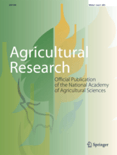
AGRICULTURAL RESEARCH
Exploring cutting-edge research to enhance food security.AGRICULTURAL RESEARCH is a distinguished academic journal published by SPRINGER INDIA, focusing on the dynamic fields of Agronomy, Crop Science, and Food Science. With an ISSN of 2249-720X and E-ISSN of 2249-7218, this journal has established itself as a valuable resource for researchers, professionals, and students dedicated to advancing agricultural knowledge and practices. The journal is recognized in the 2023 Scopus Rankings, achieving commendable quartile positions, including Q2 in Agronomy and Crop Science and Plant Science, as well as Q3 in Food Science, indicating its influential presence in the academic community. AGRICULTURAL RESEARCH aims to disseminate cutting-edge research findings, innovative methodologies, and comprehensive reviews, fostering collaboration and discussion among scholars in Switzerland and beyond. Through its commitment to scholarly excellence, this journal is pivotal in addressing contemporary challenges in agriculture, ensuring sustainability, and enhancing food security for the future.

NJAS-Impact in Agricultural and Life Sciences
Exploring interdisciplinary research for a greener future.NJAS-Impact in Agricultural and Life Sciences is a pivotal open-access journal, published by Taylor & Francis Ltd, focusing on the interdisciplinary nexus between agricultural practices and life sciences. Anchored in the United Kingdom, this journal aims to provide a comprehensive platform for the dissemination of innovative research that addresses critical challenges in environmental sustainability, agricultural productivity, and biological advancements. With its inaugural issue dated from 2023 to 2024, NJAS prominently features the latest empirical studies, reviews, and theoretical contributions that enrich existing knowledge and provoke thought among researchers and practitioners alike. Although currently ranking within the lower percentiles across various Scopus categories, the journal aspires to establish itself as a significant contributor to the dialogue on agricultural and environmental sciences. As scholars in these fields seek to bridge the gaps in understanding, NJAS invites submission from diverse perspectives, underscoring the importance of collaborative knowledge-building in addressing the complexities of our changing global landscape.
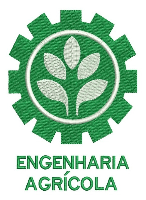
Engenharia Agricola
Advancing agricultural innovation for a sustainable future.Engenharia Agricola, published by the SOC BRASIL ENGENHARIA AGRICOLA, is a crucial open-access journal that has been at the forefront of agricultural engineering research since its inception in 1981. With an E-ISSN of 1809-4430 and an ISSN of 0100-6916, this journal stands out in the field by providing a platform for disseminating innovative studies and advancements in agricultural practices and technologies. Based in Brazil, the journal emphasizes global perspectives in agricultural and biological sciences, currently positioned in the Q3 quartile of its category, as recognized in the 2023 Scopus Ranks, where it ranks 97 out of 193 publications. Researchers, professionals, and students can access a plethora of high-quality articles that contribute to sustainable agronomy, agricultural mechanics, and resource efficiency across various environments, with open access since 2004, ensuring that critical knowledge is readily available to all stakeholders in the field.
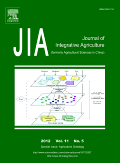
Journal of Integrative Agriculture
Advancing Agricultural Innovation Through Integrative ResearchJournal of Integrative Agriculture, published by Elsevier Science Ltd, stands as a leading platform for innovative research at the intersection of agricultural sciences. With a significant focus on integrative approaches, this journal has established itself within the academic community, reflecting its excellence through impressive Impact Factor rankings and a consistent Q1 category status in multiple fields, including Agronomy, Animal Science, and Ecology. The journal spans a wide range of topics, making it a critical resource for exploring advancements in Biochemistry, Food Science, and Plant Science. With its diverse Scopus rankings—from Rank #3 in Food Animals to Rank #14 in Animal Science—it serves as a vital repository for cutting-edge research that influences both scientific inquiry and practical applications in the agricultural domain. Operating from China and accessible through open access options, the Journal of Integrative Agriculture aims to foster collaborative research and knowledge exchange among scientists, professionals, and students worldwide, supporting the growth and sustainability of agricultural practices.

German Journal of Agricultural Economics
Cultivating Knowledge in Agricultural EconomicsThe German Journal of Agricultural Economics, published by the esteemed DEUTSCHER FACHVERLAG GMBH, serves as a pivotal platform for the dissemination of research in the fields of Agricultural and Biological Sciences as well as Economics and Econometrics. Situated in Germany, this journal, with ISSN 0515-6866 and E-ISSN 2191-4028, has established a notable presence, reflected in its 2023 category quartiles—ranking Q2 in Agricultural and Biological Sciences (miscellaneous) and Q3 in Economics and Econometrics. With a converged publication timeline from 2011 to 2024, it aims to foster dialogue and research innovation related to agricultural economics, with an emphasis on contemporary challenges and advancements in the sector. The journal seeks to cater to a diverse audience, including researchers, professionals, and students, by providing access to high-quality, peer-reviewed articles that contribute to the ongoing discourse in these critical areas of study. Whether you are looking to keep abreast of the latest findings or seeking publishing opportunities, the German Journal of Agricultural Economics is an essential resource for anyone engaged in agricultural and economic research.
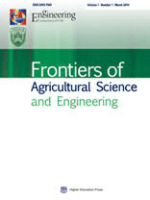
Frontiers of Agricultural Science and Engineering
Championing open-access knowledge in agricultural science.Frontiers of Agricultural Science and Engineering, published by HIGHER EDUCATION PRESS, is a distinguished open-access journal established in 2014, dedicated to advancing research across the fields of agricultural and biological sciences, biotechnology, and veterinary studies. With an impressive Q1 ranking in both Agricultural and Biological Sciences and Veterinary categories for 2023, this journal positions itself prominently within the academic landscape, reflecting the importance and quality of the research it disseminates. The journal serves as a vital platform for researchers, professionals, and students worldwide, featuring a broad array of studies that enhance our understanding of agricultural technologies, biotechnological innovations, and veterinary sciences. With a focus on rigor and accessibility, Frontiers of Agricultural Science and Engineering promotes the global exchange of knowledge, encouraging the collaboration that is essential for tackling contemporary challenges in these critical fields. Available online with a comprehensive range of article options, it continues to contribute to the scientific community's advancements in agricultural and biological disciplines.

PAKISTAN JOURNAL OF AGRICULTURAL SCIENCES
Empowering Agricultural Scholars with Vital InsightsWelcome to the Pakistan Journal of Agricultural Sciences, a prominent platform for disseminating vital research findings in the fields of agronomy, crop science, food science, plant science, and soil science. Published by the prestigious University of Agriculture in Faisalabad, this journal aims to enhance the scientific discourse surrounding agricultural innovation and sustainability in Pakistan and beyond. With an ISSN of 0552-9034 and E-ISSN of 2076-0906, the journal serves as a valuable resource for researchers, professionals, and students interested in cutting-edge agricultural developments. As of 2023, the journal is ranked in the Q3 category for Agronomy and Crop Science as well as Food Science and positioned in Q4 for Plant and Soil Science, highlighting its growing impact within a competitive academic landscape. While the Pakistan Journal of Agricultural Sciences is not currently open access, it provides a comprehensive archive of research converging from 2011 to 2024, ensuring that critical knowledge remains accessible to those striving to advance the agricultural sciences. Join us in our mission to foster innovation and support sustainable practices in agriculture.
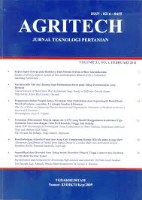
Agritech
Shaping Sustainable Practices for a Greener TomorrowAgritech is a prominent open-access journal dedicated to advancing the field of agricultural technology. Published by UNIV GADJAH MADA, FAC AGRICULTURAL TECHNOLOGY, this esteemed journal disseminates innovative research and cutting-edge practices that contribute significantly to sustainable agriculture, precision farming, and environmental stewardship. Launched in 1999, Agritech has established itself as a vital resource for researchers, professionals, and students alike, providing a platform for the exchange of ideas and findings that shape the future of agricultural technology. By embracing an open-access model, the journal ensures that high-quality research is accessible to a global audience, promoting collaboration and knowledge sharing in the agricultural community. With an ISSN of 0216-0455 and an E-ISSN of 2527-3825, Agritech remains committed to enriching agricultural practices and policies through rigorous scientific inquiry and innovation.
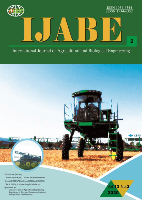
International Journal of Agricultural and Biological Engineering
Advancing innovation in agricultural and biological engineering.Welcome to the International Journal of Agricultural and Biological Engineering, a premier open-access publication dedicated to advancing the fields of agricultural and biological engineering. Established and published by the Chinese Academy of Agricultural Engineering, this journal has been at the forefront of academic discourse since its inception in 2008. With an impact factor that reflects the journal's esteemed reputation, it ranks impressively in the Q2 category for both Agricultural and Biological Sciences and Engineering, showcasing its influence in these vital fields. The journal's commitment to innovation is underscored by its open-access model, ensuring that vital research is accessible to a global audience. Covering a diverse scope of topics relevant to the integration of engineering principles in agricultural practices, this journal is an essential resource for researchers, professionals, and students alike, providing insights that drive advancements and sustainable practices within the industry. With a dedicated editorial board and a rigorous peer-review process, the International Journal of Agricultural and Biological Engineering is poised to contribute significantly to the growth and development of knowledge in agricultural and biological systems.